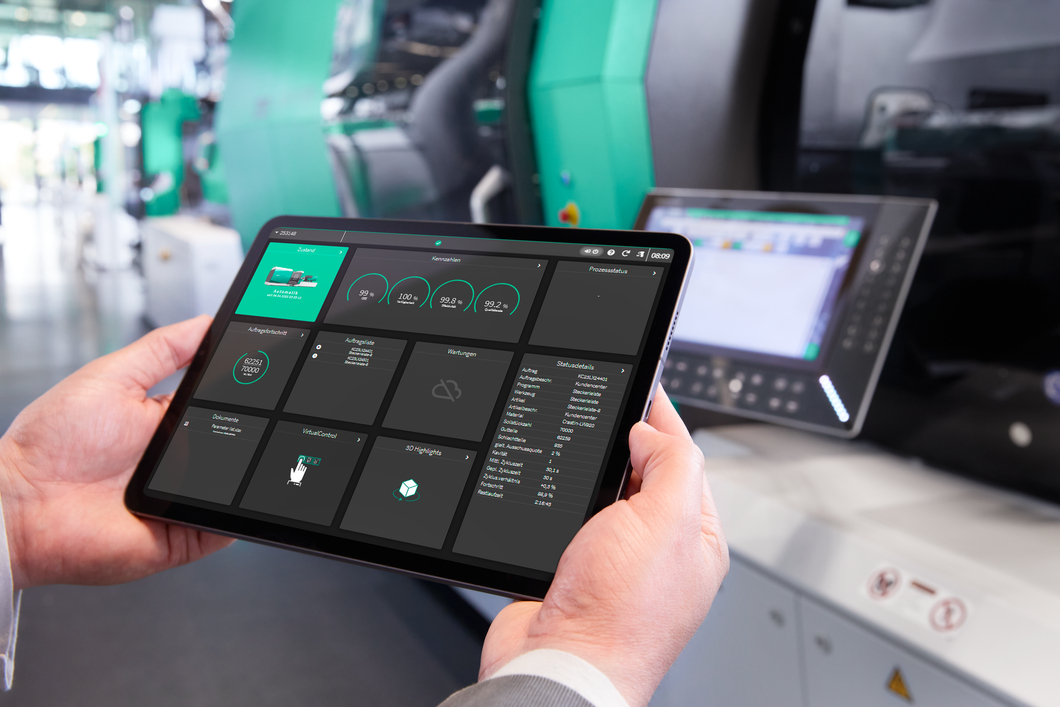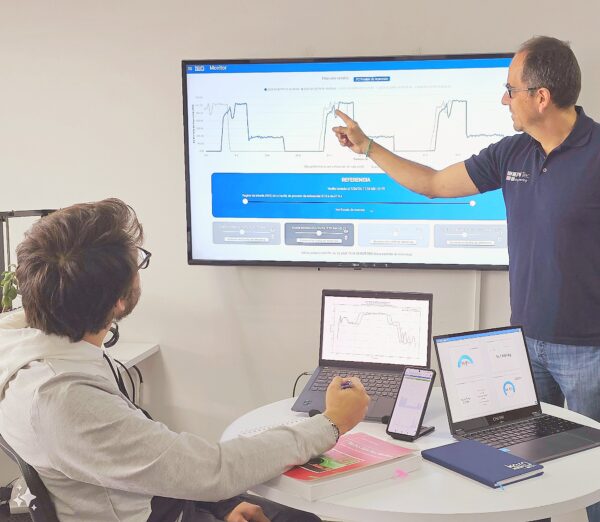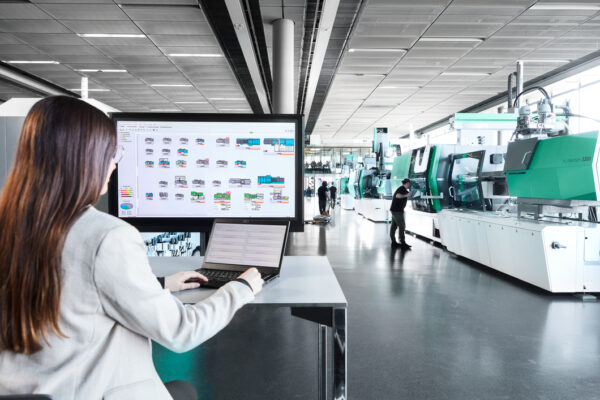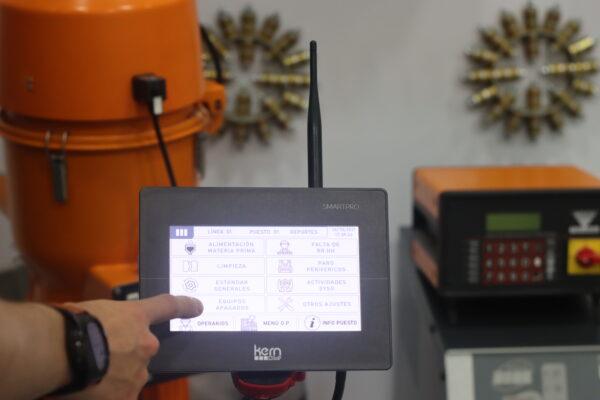Industry 4.0 in Injection Molding

As injection molders face increasing demands to improve throughput, part quality, and aesthetics, Industry 4.0’s data-driven approach will continue to reshape the molding landscape for the next years.
Digital, or smart manufacturing, is based on collecting data from multiple equipment and process sources to determine – and optimize – production performance. This so-called Fourth Industrial Revolution, or Industry 4.0, radically reshapes manufacturing across various technologies.
You can also read: AI and Injection Molding: Bridging the Gap through Research
Industry 4.0 Essentials

Injection molding data is collected from injection molding machines (IMMs) and auxiliary equipment. Courtesy of PM Tec Engineering.
Injection molding data is collected from injection molding machines (IMMs) and auxiliary equipment. Real-time monitoring with strategically placed sensors and Internet of Things (IoT) devices collects a wealth of process and material performance data.
Those sensors measure a range of key process parameters, including mold temperature, injection pressure, cycle time, energy consumption per cycle, material usage, machine utilization, downtime and its causes, defect rates, and more.
This data-driven approach helps molders optimize operational costs and manage resources to minimize waste.
With all the benefits offered by Industry 4.0 technology, smart factories, and smart molding operations are emerging as the wave of the future. In fact, according to Deloitte, 83% of manufacturers believe smart factories will transform the way products are made in five years.
Industry 4.0 in its full implementation means a fully digital, integrated process from order entry to scheduling, molding, quality control, assembly, packing and shipping. While many processors have adopted various elements of this technology, few as yet have established a fully digital process.
However, the continued shortage of skilled labor and the subsequent quest to automate more processes are driving adoption. In the coming years, more comprehensive integration of shop floor scheduling and preventive maintenance is also expected.
You can also read: Maximizing Injection Molding Simulation
Must-have Equipment
Long-established IMM suppliers like Arburg, Engel, LS Mtron and Wittmann have established digital manufacturing strategies and suites, offering fully integrated solutions. Much of this technology was displayed at NPE 2024 in Orlando, and use cases over the next five years will be telling.
Fully integrated injection molding work cells allow IMMs and auxiliary equipment to communicate seamlessly, giving operators unprecedented insight into real-time process parameters.

Arburg developed the Arburg host computer system (ALS), a manufacturing execution system designed specifically for producing plastic parts and components. Courtesy of Arburg
Arburg
Arburg has developed the Arburg host computer system (ALS), a manufacturing execution system specifically for producing plastic parts and components. ALS is the central element where the entire plastic parts production can be digitally planned and controlled, and all relevant information tracked. An injection molding plant running 20 IMMs can save approximately 1,500 hours of working time and 500 machine hours a year using the ALS, Arburg says. The ALS software can also work with incoming signals from additional sensors, such as optical inspection components of a quality-control system.
LS Mtron
Meanwhile, LS Mtron’s CSI 4.0 smart solution package integrates and controls production, equipment, data, and services in several stages: initial data collection, transforming data into meaningful information, and big data processing. It also uses AI to optimize the molding process and product quality. LS Mtron’s Smart Production Suite gives molders the latest Industry 4.0 capabilities, including 24/7 mobile access, real-time production optimization, smart mold recognition with RFID assessment, and application of molding data via QR code.
Wittmann
Wittmann’s Industry 4.0 suite includes data collection options like a hot manifold controller for a hot runner system, which can immediately tell an operator if a zone is out – and ultimately is a greater value than a less-expensive, freestanding temperature control unit (TCU) that doesn’t follow Industry 4.0 protocols.
A patented modem is central to controlling Wittmann equipment, which serves as the central communications hub for all the company’s peripherals to the primary IMM. Each device can be authenticated and automatically drive the IP device connection.
With Industry 4.0 connectivity, processors avoid searching their production plant for every equipment change for different parts and mold setups, or if a device has to be swapped out for maintenance. Wittmann’s IMM controller shows users a list of what a particular mold setup “recipe” looks like and what devices are plugged in. The user can unplug devices not used in that setup and swap in the correct devices. Once the device is authenticated, the user loads setup data, including TCU set points, blender recipe, dryer settings, and robot program for the molded part.
As Industry 4.0 equipment and controllers evolve, they become more operator-friendly and intuitive. By simplifying complex data and processes into real-time feedback and actionable insights. This technology empowers operators to excel in their roles – a significant benefit in retaining manufacturing talent.
You can also read: The Art of the Small: Strategies for Success in Micro Molding
Euromap Protocols
Established in 1964, Euromap is the umbrella organization for the European plastics and rubber machinery industry, which the organization says accounts for about 40 percent of worldwide production and 50 percent of export volumes.
Euromap publishes Industry 4.0 protocols that OEMs of IMMs and auxiliary equipment may follow to agree on signals and data transfer in 4.0 integration. Such protocols include Euromap 82.1 for temperature control devices, Euromap 82.2 for hot runner devices, and Euromap 82.3 for liquid silicone rubber dosing systems.
These protocols describe the interface between IMMs and Industry 4.0-capable devices for data exchange. Equipment makers, informed by those protocols, produce new hardware and software in accordance with that guidance.
Benefits and Services

Implementing KERN IoP systems has directly reduced costs for customers. Courtesy of PM Tec Engineering.
Through proper data collection and analysis, processors can substantially improve various injection molding performance indicators.
For instance, Dr. Miguel Garzon says clients of PM Tec Engineering of Bogota, Colombia, use the company’s KERN IoP sensor, acquisition, analysis, and data management systems to experience cycle time reductions between 10% and 30% and lower energy consumption of 7% to 25%.
Furthermore, KERN IoP users have increased overall equipment effectiveness (OEE) by 5% to 20% based on a reduction in machine startup times of up to 30% and a 10-20% reduction in scrap rates (and up to 35% in co-injection).
Implementing KERN IoP systems has translated directly into cost reductions for customers, who, on average, have experienced ROI in one to two years, Garzon says.
Also, leveraging the benefits of Industry 4.0 for injection molding doesn’t always require an unmanageable investment.
Garzon says KERN IoP tailors its solutions for Latin American countries to be cost-effective and easy to integrate with existing systems. “Leveraging affordable and scalable Industry 4.0 technologies enables Latin American manufacturers to enhance their competitiveness without requiring substantial upfront investment.”
In a November 2023 survey, Arburg found that 96% of users were very satisfied or satisfied with ALS, particularly for transparency, improved data quality, and reduced machine downtime. Respondents increased OEE and overall plant efficiency by more than 26% on average.
Sustainability and Industry 4.0

Manufacturers can optimize their processes by precisely monitoring every stage of the injection molding process.
Sustainability has become a critical concern for the plastics injection molding industry. Industry 4.0 technology can help reduce environmental impact and promote circular economy practices, particularly the use of post-consumer recycled resins (PCR).
PCR resins can be challenging to process optimization because of variations in materials. By precisely monitoring every stage of the injection molding process – particularly in-mold material behavior – manufacturers can confidently use more PCR in their products.
“By utilizing real-time data from sensors and IoT devices, manufacturers can ensure that the properties of PCR resins, such as viscosity and thermal stability, are consistently maintained within optimal ranges,” Garzon advises. “This level of control is crucial for maintaining product quality and performance when using recycled materials, which often exhibit greater variability compared to virgin resins.”
You can also read: Packaging Sorting 4.0: Digital Watermarks & Fluorescent Markers
Involving AI
As data is collected and stored, analyzing it to optimize its usefulness becomes increasingly critical. Enter AI and machine learning to make it all make sense and perform better—even helping IMMs make “decisions” on their own regarding process adjustments.
Arburg helps and guides operators in day-to-day molding with its “ask ARBURG” chatbot. The chatbot contains comprehensive injection molding knowledge that is easy to access and answers specific questions about machines and processes; it also identifies and rectifies fault causes.
At KERN IoP, “our data analytics and machine learning algorithms can identify patterns and predict outcomes based on historical data,” Garzon notes. “This capability allows manufacturers to adjust processing parameters dynamically, optimizing the use of PCR resins and reducing material waste.”
Predictive maintenance is another key way machine learning plays a part in Industry 4.0-driven injection molding. Sensors embedded throughout molding equipment collect performance data, which is analyzed to predict and prevent failures. By developing data-based proactive maintenance schedules, molders minimize machine downtime and maintenance costs while extending equipment life.
